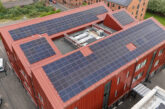
The latest data from MCS (Microgeneration Certification Scheme), the standards organisation for home grown renewable energy and heating technology across the UK, shows record numbers of renewable installations in 2022 with a 65% increase compared to installations recorded in 2021.
In 2022, a total of 163,341 MCS certified installations were registered, over 80% of which were electricity generating technologies – mainly solar PV. This marks the highest annual deployment since 2015, when just over 200,000 installations were registered.
There was substantial growth of solar PV installations in 2022, more than doubling those seen in 2021. With 130,596 solar PV installations throughout the year, there was an overall increase of 114% when compared to the number of installations in the previous year.
Data shows that heat pumps have seen a significant rise in 2022 with more than 30,000 installations registered between air source and ground/water source technologies. March 2022 saw the largest spike in heat pump installations of any month in scheme history, aligning with the closure of the Domestic Renewable Heat Incentive scheme. Heat pumps are the second most popular technology type behind solar PV and accounted for 19% of total installations last year.
Heat pump uptake remained high following the launch of the government’s Boiler Upgrade Scheme (BUS), which launched in May 2022 to encourage households across England and Wales to access a £5,000 or £6,000 grant to replace their boiler with a more environmentally friendly heating system. During 2022, almost 9,000 BUS vouchers were issued with a value of nearly £45 million; under the scheme, the government aims to fund 90,000 heat pumps by 2025.
Battery storage is a newcomer in the registered installations for 2022, with the first MCS certified battery storage installation being registered in April 2022. Since then, battery storage has seen a steady growth, finishing the year with 50 certified contractors and 269 installations – this was up from only two contractors registered in 2021.
In total, 780 new contractors became MCS certified in 2022 which is more than double the net increase from 2020 to 2021. This makes 2022 the highest annual increase of certified contractors in over a decade. Of these new contractors, 67% are certified for electricity generating technologies, evidencing further the increasing appetite for solar PV on UK homes.
Ian Rippin, CEO of MCS, said: “We’re pleased to report our second strongest year since 2015, illustrating the sector’s upward trajectory. We had an incredibly busy 2022 and the data confirms the progress we’ve made. The future of small-scale renewable installations is becoming increasingly important, and we continue to play a crucial role in the decarbonisation of the UK’s homes.
“The growth we’ve seen in domestic renewable electricity systems over the past year may also give some insight into the growing consumer reliance on home-grown energy in the UK during the cost-of-living crisis. As electricity prices skyrocket, more people are turning to renewable solutions to generate their own power at home.
“Looking ahead, we need to drive this momentum and upward mobility at pace and continue to ensure consumer confidence across all technology types. To support this and ensure government targets are met, more skilled contractors are needed. As such, we will launch the Low Carbon Heating Technician Apprenticeship later this year. We are confident this will attract young people and career-changers to the industry, creating a more diverse workforce that meets the demands of the industry while providing future-proof careers in the green sector.”
Since MCS began recording installations, the scheme has seen more than 1.5 million certified systems go into UK homes. This was achieved by the ever-growing MCS contractor base, which now includes more than 3,000 certified businesses.
The company continues to see impressive growth into 2023 and the expansion of UK renewables shows no signs of slowing.
MCS recently launched the MCS Data Dashboard to enable people to track the evolving picture of low carbon installations in near-real-time.
Register for free to track trends and opportunities in the uptake of small-scale renewables across the UK here









